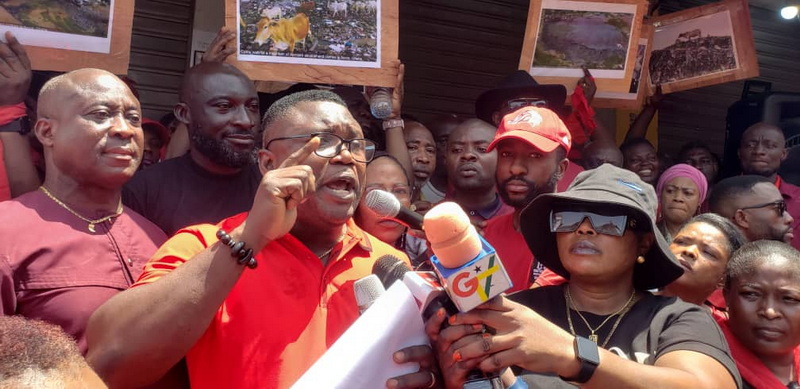Members of the Ghana Used Clothing Dealers Association on Wednesday organised a sit-down strike to protest against OR Foundation over its claim that the association’s business is a form of waste that poses a danger to people.
The association, which is a member of the Ghana Union of Traders Association (GUTA), warned the foundation and its local collaborators to stop negative campaigns against their business because second-hand cloth dealership is a globally recognised business.
The foundation, under its Stop Colonialism campaign, published an article on its website which says Kantamanto sees 15 million garments every week, and 40% of the average bale leaves Kantamanto as waste, causing a public health crisis and destroying livelihoods and the environment.
The association rejected that claim, describing the widely circulated report as not only misleading but an attempt to collapse the thriving used clothing industry in Ghana.
To counter that claim, the association, with the support of its mother organisation, the Ghana Union of Traders Association (GUTA), embarked on a sit-down strike to show their anger about the development.
In an interview, an executive member of the association, Mr Aikins Boakye Mensah, said the OR Foundation has, over the years, circulated inaccurate and damaging reports that portray the Kantamanto Market and Ghana’s secondhand clothing trade as a dumping ground for textile waste.
“They’ve claimed in international publications that over 15 million garments enter Kantamanto weekly and that 40% end up as waste. We find these figures highly exaggerated, misleading, and not representative of the realities on the ground,” he said.
Mr Mensah stressed that the majority of used clothing imported into Ghana is sorted, reused, reworked, and resold, forming the backbone of a circular economy that sustains more than 30,000 direct traders and over 100,000 livelihoods.
These include head porters (kayayei), tailors, truck pushers, transport operators, loaders, and food vendors, who operate daily around the Kantamanto Market.
He added that the used clothing trade is not a waste problem, but a livelihood solution, providing affordable clothing for millions of Ghanaians and employment for thousands of families.
Addressing the media, the President of the Ghana Union of Traders Association (GUTA), Dr Joseph Obeng, said any attempt to ban second-hand clothing will cause GUTA to embark on nationwide demonstrations.
Dr Obeng disclosed that the traders’ union is putting things together to go into the recycling of second-hand clothing.
“The OR Foundation’s portrayal of our trade as a global environmental hazard is not only an attack on the dignity of hardworking Ghanaians, but also an attempt to undermine a vibrant sector of the informal economy,” he said.
He further emphasised, “The OR Foundation does not speak for us, nor do they represent our lived experiences or interests. We reject the portrayal of Ghana as a global dumping site — it is false, harmful, and disrespectful.”
Mr Mensah called on the government, civil society organisations and Ghana’s development partners to independently investigate the claims.
He therefore urged the media to engage the leadership of the association concerning their activities.
OR Foundation is a public charity in the USA and a registered charity in Ghana that has been operating in both countries since 2011.
Working at the intersection of environmental justice, education and fashion development, its mission is to identify and manifest alternatives to the dominant model of fashion – alternatives that bring forth ecological prosperity, as opposed to destruction, and that inspire citizens to form a relationship with fashion that extends beyond their role as consumer.
Its goal is to catalyze a justice-led circular economy. There are many layers to this work, including immediate relief through direct action on human rights and environmental abuses, educational programming and awareness in order to shift individual actions, and research and institutional advocacy to steer systems-level policies and investments.
DISCLAIMER: The Views, Comments, Opinions, Contributions and Statements made by Readers and Contributors on this platform do not necessarily represent the views or policy of Multimedia Group Limited.

